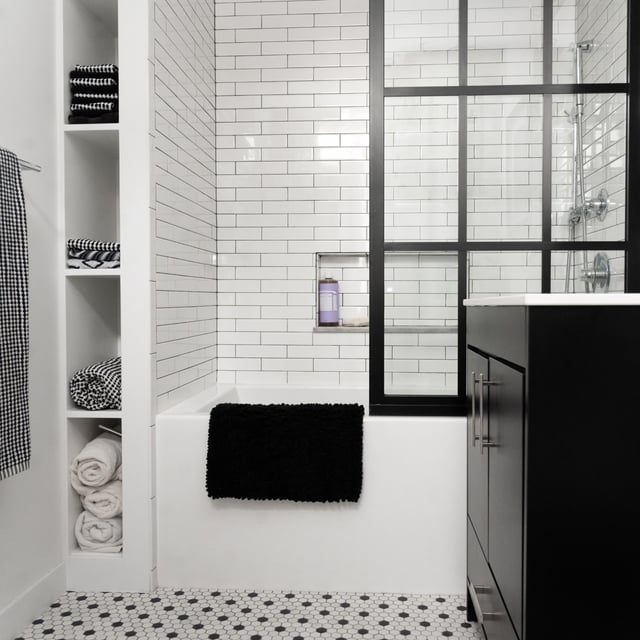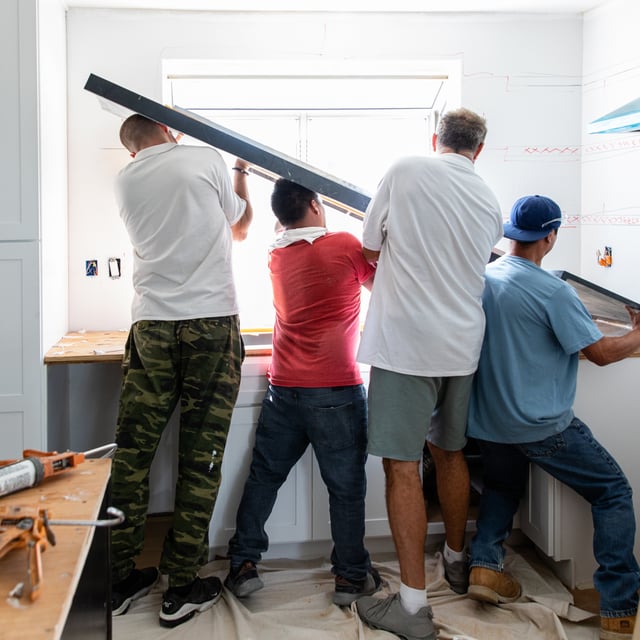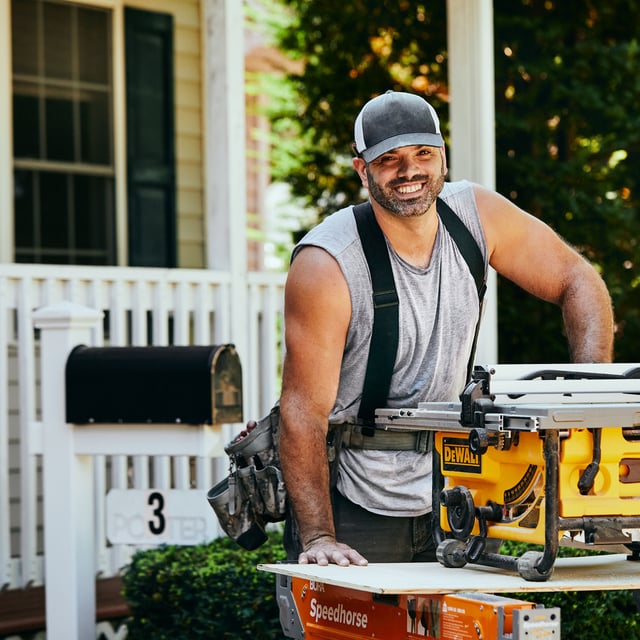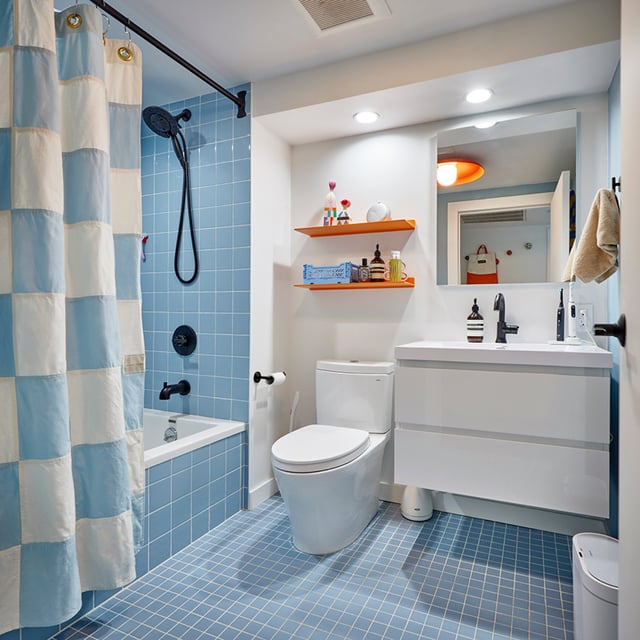
Remodeling
How to Finance a Bathroom Remodel in New Jersey
03.19.2025

In This Article
Renovating in New York City is like playing a high-stakes game of Tetris, where every piece has to fit perfectly, or the whole thing collapses. Between strict building codes, unyielding co-op boards, and the ever-present threat of accidentally drilling into your neighbor's wall (yes, that's a thing), tackling a renovation here is not for the faint of heart. It's a city where even deciding what shade of white to paint your walls can turn into a neighborhood debate.
Unlike sprawling suburban spaces, NYC renovations demand a level of precision that's borderline surgical. Square footage is treated like gold dust, and every decision has to be made with an artist's creativity and an engineer's discipline. Want to knock down a wall? You might need an architect, an engineer, and possibly a séance to convince your building's board to approve it.
Thinking about installing a washer and dryer? Prepare for a crash course in plumbing codes and soundproofing, or risk becoming the most hated person in your building.
Understanding local rules and challenges isn't just important—it's survival. Permits, zoning laws, and historic preservation rules can slow down your dream project faster than a crosstown bus at rush hour.
And let's not forget the contractors juggling ten other jobs, the hidden costs lurking in ancient wiring, and the joy of scheduling deliveries through your building's narrow two-hour window. Welcome to NYC renovations—where the chaos is real, but the results can be magic.
Renovating in NYC means navigating a maze of rules and red tape that would make even the most seasoned renovators sweat. From permits to building codes, it's not just about transforming your space—it's about doing it without ending up on your building's naughty list or in a standoff with city inspectors.
Permits are the magical pieces of paper that turn your renovation dreams into legal reality. In NYC, you'll probably need one if you're planning anything beyond slapping on a coat of paint or swapping out a light fixture. Thinking about moving a wall? Permit. Adding plumbing? Permit. Installing a new stove? You guessed it—permit.
The process can feel like applying for college. You'll need detailed plans, approvals, and maybe even some luck. The Department of Buildings (DOB) is the gatekeeper here, and they don't take shortcuts lightly. Getting caught without a permit can lead to fines, delays, and the kind of headaches that even the strongest coffee can't fix.
Renovating an NYC apartment is like choosing your own adventure—except every path has its own challenges.
In a condo, you'll face standard building rules and a management board that's relatively chill compared to co-ops. Co-ops, however, are a whole different beast.
Before you even think about renovations, you'll need board approval, which often involves submitting an application that rivals a legal brief. They'll scrutinize everything, from your contractor's license to your proposed hours of work. Want to renovate during the summer? Not happening if the building has a summer work moratorium.
If you're lucky enough to own a townhouse, congrats!
You're the king or queen of your castle. But don't get too comfortable. Townhouses come with their own set of rules, especially if your home is in a historic district. Suddenly, that sleek modern facade you wanted might have to look like it was built in 1892.
Here's where NYC really shines—building codes. They're detailed, they're specific, and they're not up for negotiation.
For instance, did you know that staircases in residential buildings must have a minimum tread depth and riser height? Or that certain apartments require fireproof doors? If you're working with an older building, you may also need to bring parts of your home up to modern standards, like upgrading electrical wiring or installing smoke detectors.
And don't forget about noise insulation. If you're replacing floors, building codes often require soundproofing to keep your downstairs neighbor from filing noise complaints every time you walk across the room. Even minor projects can turn into major headaches if you overlook these details.
Navigating NYC's renovation rules might feel like you're running an obstacle course in the dark, but understanding them upfront can save you time, money, and possibly your sanity. Sure, the process is a little chaotic, but hey—so is living in New York, and we wouldn't have it any other way.
Renovating in NYC is a bit like ordering brunch in Manhattan—expect it to cost more than you thought, take longer than you planned, and come with at least one surprise side dish you didn't ask for. Planning your budget is critical because, let's face it, even a small mistake can turn your dream home into a financial horror story.
First, let's talk numbers. Renovation costs in NYC are not for the faint of heart. A basic kitchen renovation in the city can set you back $25,000 to $50,000, while a high-end redo might cost upwards of $150,000. Bathrooms are slightly cheaper but still pricey, with average costs ranging from $10,000 to $40,000, depending on how many gold fixtures you're eyeing.
Need new floors? Expect to pay anywhere from $10 to $20 per square foot for hardwood, with installation costs piling on top of that. Want to add custom millwork or built-ins? Budget for at least $10,000 because every cabinet-maker in the city apparently has an MFA in fine arts. And let's not even get into townhouses—gut renovations can easily hit six or seven figures, depending on how much you hate your current layout.
Why are NYC renovations so expensive? Blame it on the city's quirks.
First, the age of the building plays a huge role. If you're working with a pre-war apartment, you'll likely run into charming surprises like lead paint, ancient wiring, or plumbing that looks like it was installed during the Prohibition. Bringing these up to code isn't optional, and it isn't cheap.
Scope is another budget-buster. Swapping out countertops is one thing, but if you're knocking down walls or moving plumbing, you'll need more permits, specialized contractors, and possibly a small miracle. And don't forget the dreaded "hidden costs." Think asbestos abatement, structural issues, or that time the contractor finds out your walls are hiding a family of pigeons (it happens).
Finally, location matters. Renovating in a doorman building might mean extra restrictions and fees. And if your building has an elevator that's too small for construction materials, you'll be paying workers to lug everything up the stairs. Fun!
Now that you know the stakes, how do you keep your budget from spiraling out of control? Start by overestimating everything. Seriously, if you think something will cost $20,000, assume it'll actually be $25,000—or more. Inflation and unforeseen problems are as reliable as MTA delays.
Next, prioritize. If your budget is tight, decide what's non-negotiable (like replacing that hideous tile in the bathroom) and what can wait (maybe those custom Italian light fixtures aren't essential).
Get multiple quotes from contractors, and don't just pick the cheapest one. A lowball estimate might mean corners are being cut—corners you'll end up paying to fix later. And always include a contingency fund, typically 10-20% of your total budget. That way, you're not scrambling for extra cash when something inevitably goes wrong.
Lastly, stick to the plan. It's easy to get carried away when you're deep into the renovation but resist the temptation to "just add" a few extra upgrades. Those $500 decisions add up faster than you think. And remember, this is NYC—there will always be another project to tackle later.
With the right planning, a sense of humor, and maybe a little extra espresso, you can turn your NYC renovation into a success story—and still have enough left over for overpriced avocado toast.
Finding the perfect contractor or architect in NYC is like dating—there are plenty of options, but only a few are trustworthy, compatible, and won't ghost you halfway through the project. The stakes are high, and the last thing you want is to swipe right on someone who leaves you with a half-finished kitchen and a pile of regrets.
The first step in finding a contractor in NYC is to cast your net wide but wisely. Start with recommendations from friends, neighbors, or even that overly chatty person in your building who just completed their bathroom renovation. Referrals are gold because you can see the results firsthand and get the dirt on what working with the contractor is really like.
Online reviews are another great resource—just remember to take them with a grain of salt. If you see ten glowing reviews and one scathing one, chances are that person just had a bad day. But if every review mentions delays, cost overruns, and mysterious disappearances, run.
Once you've narrowed it down, vet them thoroughly. Ask for a portfolio of past projects, proof of insurance, and their DOB (Department of Buildings, not date of birth) license number. A good contractor won't just hand over the info—they'll be proud to show off their work.
When it comes to qualifications, experience is king. Look for contractors or architects who have tackled projects similar to yours. If you're renovating a tiny co-op bathroom, you don't want someone whose specialty is sprawling Brooklyn townhouses.
Communication skills are just as important as technical ones. You'll be in close contact with this person for weeks, maybe months, so make sure they're responsive, clear, and don't make you feel like you're asking dumb questions. Spoiler: there are no dumb questions when you're paying someone to tear apart your home.
And let's not forget about subcontractors. Many NYC contractors rely on teams to handle specific tasks like plumbing and electrical work. Make sure the subs are also qualified and insured because you don't want your project held up by someone who doesn't know the difference between a wrench and a wire cutter.
In NYC, local expertise isn't just a nice-to-have—it's essential. Renovating here is its own beast, with unique rules, regulations, and quirks that out-of-town contractors simply won't understand. A contractor with local experience will know how to navigate co-op board approvals, deal with DOB inspections, and avoid ticking off your neighbors with late-night hammering.
Referrals are another layer of protection. If a contractor comes highly recommended by someone you trust, it's a good sign they know their stuff. Referrals also help you avoid those charming scammers who overpromise, underdeliver, and disappear faster than a taxi during a rainstorm.
A final pro tip? Don't just rely on glowing references provided by the contractor—ask for contact info from their last project. If they hesitate, it's a red flag. A great contractor will have clients who are more than happy to sing their praises.
Choosing the right contractor or architect can feel overwhelming. Still, with some due diligence, a bit of patience, and maybe a touch of humor, you can find someone who turns your NYC renovation dreams into reality—without any nightmare scenarios.
Renovating in NYC is like waiting for the subway during rush hour—you think it'll take five minutes, but you're still standing there 20 minutes later, wondering where it all went wrong. Managing your renovation timeline is essential, and while there will inevitably be delays (because, of course, there will), a little planning can keep the chaos to a minimum.
Let's start with some ballpark figures. For smaller projects like repainting, swapping light fixtures, or upgrading flooring, you're looking at a few days to a couple of weeks. A bathroom renovation? That's usually a four-to-eight-week commitment, depending on how fancy you're getting with tile and plumbing. Kitchens, on the other hand, are the divas of renovations and can take anywhere from eight to 16 weeks—or longer if you're installing custom cabinetry.
If you're tackling a full gut renovation, brace yourself. Six months is a good starting point, but don't be surprised if it stretches to a year. Townhouses often take even longer, thanks to structural work, permits, and the occasional squirrel infestation (yes, it happens).
Of course, these timelines assume everything goes smoothly. Spoiler alert: it rarely does.
In the world of NYC renovations, delays are as predictable as bagel shops running out of your favorite flavor by noon. Common culprits include permit approval delays, materials stuck in transit, or your contractor juggling too many projects. And let's not forget the surprise discoveries—because every NYC building has them. Lead paint, outdated wiring, and unanticipated plumbing issues have a knack for popping up at the worst possible time.
To minimize delays, start by padding your timeline. If you think it'll take six weeks, plan for eight. Be proactive about permits and approvals—get those applications in as early as possible. And when it comes to materials, don't wait until the last minute to order. Shipping delays are real, and you don't want to hold up your renovation because your dream tile is stuck on a container ship somewhere in the Atlantic.
Another tip? Communicate with your contractor regularly. Weekly check-ins can help you stay on top of potential issues before they snowball. And if your contractor is juggling multiple projects (which they almost always are), don't be shy about nudging them to stay on schedule. A little polite persistence goes a long way.
Renovating in NYC means playing nice with your building management and neighbors—or at least trying to. Building management often has its own rules and restrictions, like work hours (typically 9 AM to 5 PM), elevator reservations, and requirements for contractor insurance. Ignoring these rules can lead to fines or outright halts to your project, so make sure you're in the loop from the start.
Coordinating with neighbors is just as important, especially if your renovation involves noise. No one wants to hear a jackhammer at 7 AM, and if you're too disruptive, you might find yourself on the receiving end of some very pointed passive-aggressive notes. Let your neighbors know what to expect, and consider a peace offering—coffee gift cards or a box of cookies can go a long way toward softening the blow of a noisy renovation.
For co-ops, the process is even more intense. Boards often require detailed renovation plans and may demand that your contractor sign noise, cleanliness, and timelines agreements. They might also enforce work stoppages during holidays or summer months, so plan accordingly.
Renovating in NYC is a marathon, not a sprint, but with the right prep, a dose of patience, and a sense of humor, you can manage your timeline without losing your mind—or your lease. Just remember, the end result is worth it. Probably.
Renovating in a co-op or condo in NYC is like hosting a dinner party with a guest list you didn't pick—everyone has an opinion, and you're the one stuck trying to keep everyone happy. Between co-op boards, HOAs, and building management, there are a lot of cooks in the kitchen (which you probably can't renovate without approval). But with the right strategy, it's possible to pull off a stunning renovation while navigating the maze of rules, regulations, and, yes, strong personalities.
If you thought New York's dating scene was tough, wait until you meet a co-op board. These folks hold the keys to your renovation dreams—or nightmares. Co-ops are notoriously strict, and for good reason: everyone in the building shares financial responsibility, so even your choice of backsplash can feel like a group decision. Boards are often concerned about noise, structural integrity, and how your project might affect neighbors.
Want to knock down a wall? Be prepared to convince them that your renovation won't bring the whole building down.
Condos, on the other hand, tend to be a little more relaxed. Since ownership is more individual, the approval process isn't quite as grueling. That said, you'll still be dealing with an HOA (Homeowners Association), which often enforces its own set of rules. They're less likely to micromanage your renovation, but don't mistake their silence for indifference—they can shut you down if you don't follow protocol.
The approval process for co-ops and condos is the stuff of legends. First, you'll need a detailed renovation plan, including architectural drawings, contractor information, and a timeline. Think of it as a resume for your renovation.
The board or HOA will review it, sometimes with the help of an engineer, to ensure your plans won't disrupt the building. And yes, this can take weeks—or even months.
Rules vary but expect restrictions on work hours (typically 9 AM to 5 PM), noise levels, and elevator usage. Some buildings won't allow renovations during the summer or holiday season, so plan accordingly.
Many co-ops also require a hefty deposit or renovation fee, which is returned if you don't leave the building looking like a construction site.
The process is usually quicker for condo owners but still requires submitting plans and adhering to building rules. Coops and condos often mandate contractor insurance and may require you to use building-approved vendors for tasks like plumbing or electrical work.
Building management is the unsung hero—or villain—of your renovation. They enforce the rules and coordinate logistics, so keeping them on your side is crucial. Start by scheduling a meeting to review their guidelines, which often include details on debris removal, noise restrictions, and elevator use. Many buildings require you to reserve the freight elevator for material deliveries, and these time slots can be as rare as a sunny day in February.
Communication is key. If your contractor needs extra time or you're expecting a big delivery, let management know in advance. Surprises are fun for birthday parties, not for renovation projects. And don't forget to grease the wheels—small gestures like holiday tips or a thank-you card can make a big difference when you need a favor.
Lastly, keep things tidy. Most buildings have strict cleanliness policies, and a messy hallway can lead to complaints or fines. Make sure your contractor is aware of these rules and follows them religiously. After all, nothing derails a renovation like a neighbor slipping on drywall dust and deciding to sue.
Renovating in a co-op or condo might feel like an Olympic-level balancing act, but you can make it work with preparation, patience, and a little charm. Just remember: the goal is to create a space you love while avoiding lifelong feuds with your neighbors. It's a challenge—but this is NYC. You've got this.
Renovating in NYC isn't just about turning your Pinterest boards into reality—it's about managing the chaos that comes with limited space, tight schedules, and a city that seems designed to test your patience. But with the right logistics game plan, you can keep things running (mostly) smoothly and avoid your renovation turning into a sitcom plot.
NYC apartments are many things—cozy, charming, full of character—but spacious? Not so much. Renovating in tight quarters means you're often working around a lack of storage, awkward layouts, and that one corner you swear defies the laws of geometry. The key is to plan, prioritize, and get creative.
Start by clearing out as much space as possible before construction begins. If you can, relocate to a friend's or relative's place (bonus points if they have a guest room and strong Wi-Fi). If staying put is your only option, designate a single room or area as a construction-free zone where you can escape the dust and noise.
You'll also want to embrace vertical storage. Use shelves, hooks, and collapsible furniture to keep essentials accessible without cluttering your space. And don't forget to measure everything—including doorways and hallways. Nothing kills renovation momentum like discovering your shiny new appliances won't fit through the front door.
Delivery day in NYC is a special brand of chaos. Your contractor's materials might arrive on a flatbed truck at the exact moment your neighbor's Amazon package mountain is taking over the lobby. The trick is timing and communication.
Start by coordinating with your contractor and building management to schedule deliveries during approved hours. Many buildings require you to reserve the freight elevator, and slots can fill up fast—think of it like snagging a reservation at a trendy brunch spot.
When the delivery arrives, ensure someone is on-site to receive it. This could be you, your contractor, or a designated friend who owes you a favor. Unattended materials can disappear faster than a cab on a rainy day, and you don't want to explain to your contractor why their drywall is suddenly AWOL.
Lastly, confirm what's being delivered before the truck pulls away. Construction materials have a habit of going missing, showing up damaged, or arriving in sizes that would only fit a dollhouse.
If you're tackling a full-scale renovation, chances are your furniture and belongings need to move temporarily. But where do you stash your stuff in a city where closets double as bedrooms?
Short-term storage units are a popular option. Companies like MakeSpace and Clutter even pick up and deliver your items, saving you the headache of renting a moving truck. If your renovation scope is small, you might be able to get away with renting a small unit or stashing things at a generous friend's place (wine bribes help).
For those on a tighter budget, consider renting plastic bins from companies like Gorilla Bins. These stack neatly, protect your belongings, and are surprisingly affordable. Pro tip: label everything. The last thing you want post-renovation is to play the world's most frustrating game of "Which Box Holds My Sheets?"
Renovation waste isn't glamorous, but it's unavoidable. From drywall scraps to old fixtures, your project will produce more debris than you'd think—and NYC doesn't make getting rid of it easy.
Start by asking your contractor how they plan to handle debris removal. Many pros include this in their fees and will haul away waste to an approved disposal site. If not, you might need to rent a dumpster or hire a separate removal service. Be sure to check your building's rules—some require debris to be bagged in specific ways or disposed of during set hours.
Don't forget about donations! Items like old cabinets, appliances, and furniture can often be repurposed by organizations like Habitat for Humanity. Not only is this more eco-friendly, but it also clears space while giving your discarded items a second life.
You can wrangle your renovation logistics without losing your mind—or your security deposit- by staying organized, communicating clearly, and keeping a sense of humor. Just remember: at the end of the day, it's all worth it when you're sitting in your dream space, sipping coffee, and marveling at how you pulled it off.
When it comes to NYC renovations, seeing is believing. The challenges of remodeling in the city are real, but the rewards are even better—especially when you work with experienced pros who know how to navigate the quirks of New York real estate. Let's take a look at some standout bathroom and kitchen renovations brought to life with Block Renovation, offering inspiration and insight into what's possible.
Matt, a homeowner in Greenwich Village, wanted his 40-square-foot bathroom to feel modern yet timeless. By keeping the original layout and preserving the existing tub, he saved money while still creating a stunning space. A vibrant green accent wall paired with a natural wood vanity and brass fixtures added just the right mix of personality and sophistication. The result? A bathroom that feels as stylish as it is functional—and it didn't break the bank.
First-time renovator Grace, from Williamsburg, turned her nerves into excitement with a tub-to-shower conversion for her 40-square-foot bathroom. By incorporating patterned tiles in the wall niche, she maintained her apartment's bohemian-classic aesthetic while adding a touch of whimsy. "It feels like I'm stepping into a spa every time I use my bathroom," she said. Her smooth renovation experience with Block helped make the transformation enjoyable, not stressful.
Updating their Brooklyn condo's two bathrooms and kitchen was a top priority for Chris and Ryan. They opted for unique designs that matched their personalities: a black-and-white bathroom for Chris's clean-lined sensibilities and a playful pink bathroom for Ryan's artsy flair. Their kitchen, meanwhile, blends traditional details with a modern sensibility to create a space that's both beautiful and functional for a busy lifestyle. Chris summed up their experience, saying, "The build was seamless, and our contractor was incredibly responsive."

Every successful NYC renovation shares a few common themes: smart planning, strong communication, and choosing the right professionals. Matt's cost-saving choices, Grace's attention to design details, and Chris and Ryan's ability to blend their styles all showcase how working with skilled contractors and clear plans can turn challenges into stunning results.
Whether you're reimagining a small bathroom, upgrading a kitchen, or tackling multiple spaces, NYC renovations can be a smooth experience with the right team and approach. So dream big—you just might end up with a space that feels like it's straight out of a magazine.
Renovating in NYC is a wild ride, but it's totally doable with the right prep and a solid team. We've covered it all—budgeting, working with co-op boards, managing deliveries, and staying sane in tight spaces. The key? Plan thoroughly, expect the unexpected, and trust the pros for the tricky stuff (unless you're itching to fix century-old plumbing yourself).
Renovation isn't a sprint; it's a marathon with a few surprise hurdles. Set realistic goals, keep communication open, and don't skimp on that contingency fund. And when it's all done, you'll not only have a stunning new space but also the perfect reason to host a housewarming party—just maybe skip the red wine near your new white tile.
What are the most common permits needed for home renovations in NYC?
How can I estimate the budget for my NYC renovation?
What are the typical renovation timelines for apartments versus townhouses in NYC?
What steps should I take to get approval from my co-op board for a renovation?
How do I find a reliable contractor experienced in NYC home renovations?

Renovate confidently with Block
Easily compare quotes from top quality contractors, and get peace of mind with warranty & price protections.
Thousands of homeowners have renovated with Block

4.5 Stars (100+)

4.7 Stars (100+)

4.5 Stars (75+)

Remodeling
How to Finance a Bathroom Remodel in New Jersey
03.19.2025

Remodeling
Should You Renovate Before Selling Your Home?
03.19.2025

Remodeling
How to Renovate in Boston: A Complete Guide
03.19.2025

Remodeling
How to Renovate in New York City: A Complete Guide
03.19.2025

Remodeling
A Complete Guide to Bathroom Renovation Costs in Brooklyn
03.19.2025
Renovate confidently